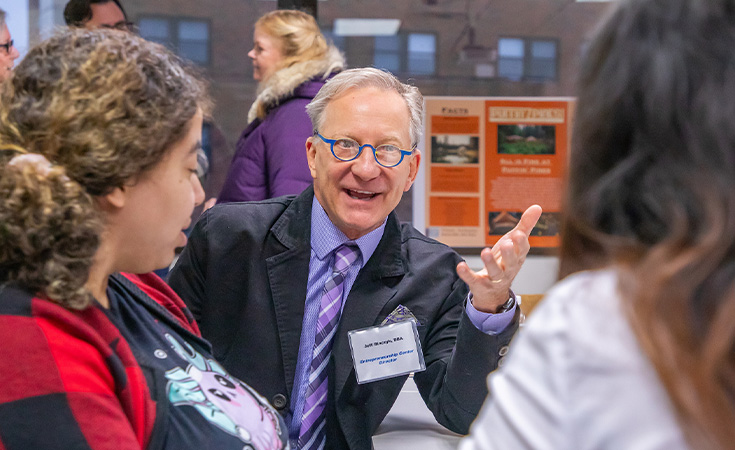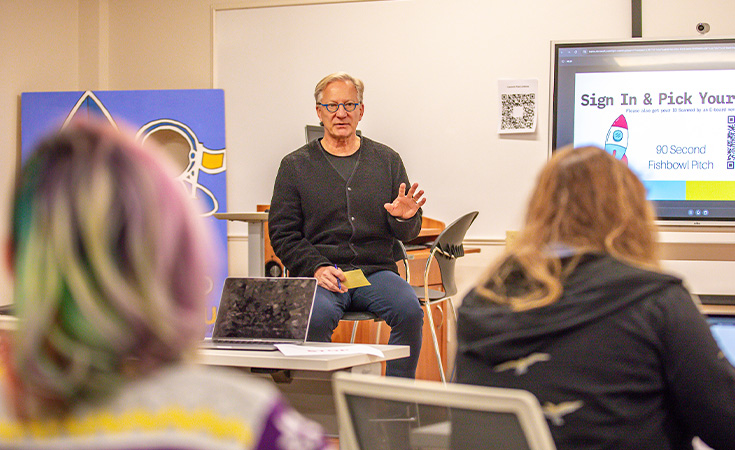Jeff Binczyk '23 DBA is a busy man.
A typical day might include advising a budding entrepreneur on how to turn their passion into profits, coaching a sophomore on a Sharkfest pitch and talking to a baker in Queens who needs help marketing their bread pudding.
Having spent most of his career working for successful food entrepreneurship startups, Binczyk wrote his JWU doctoral dissertation on startup failures. Now, as director of the Larry Friedman Entrepreneurship Center — known as the Launch Pad — he is focused on helping JWU students develop their ideas and dreams into solid commercial enterprises.
For Binczyk, helping the Launch Pad blast off at JWU makes all kinds of sense when he considers “the incredible heritage of Ms. Johnson and Ms. Wales, who were focused on entrepreneurship from the very beginning in 1914.”
Students seek out the Launch Pad from every college at the university — from psychology, animal science and product design majors to those studying culinary arts, health and wellness, and food & beverage enterpreneurship, all have drawn on Binczyk’s business savvy. The recent merger of the colleges of Hospitality and Business, he predicts, will encourage more Hospitality students to take advantage of the one-on-one mentoring and workshops the Launch Pad offers all students free of charge.
Some of the young entrepreneurs who visit the fourth floor of Xavier (or over Zoom) have only the seed of an idea. Others are further on the journey but need feedback, and a few have all the pieces in place and need help with their pitch to potential investors.
“My ultimate goal,” says Binczyk, “is to have them walk off the commencement stage with a diploma in one hand and a business plan in the other.”
Catalina Baclawski ’26 came to Binczyk with a bakery concept but no clear direction. “He helped me figure out that I wanted to do an elevated bakery in the morning and a bar with small bites and live music in the evening,” she says. “His approach was, ‘I want to hear what you want and then we can go off of that.’”
Often, says Binczyk, when the talk turns to dollars and cents, students get nervous. Baclawski was no exception. “In previous classes, we had touched on financials, but we really never did a deep dive,” she says. “Jeff laid it all out like, ‘This is what we’re going to have to do. This is everything that needs to happen.’”
Maddy Stange ’26, a Baking & Pastry student, had several summers of selling cupcakes at her hometown farmers market under her belt when she began talking to Binczyk. She had a sense of what her customers liked, but Binczyk encouraged her to confirm her hunches with a survey. That revealed that what her customers really wanted was donuts, so the next summer they got top billing at her stall. “We keep looking at the data every year,” says Stange, “and now I have all this information compiled for when I go for funding for a brick and mortar.”
It’s a diverse profile, with students from every college in the university, and I think that generates multiple ways of approaching things.Jeff Binczyk, Director, Larry Friedman Center for Entrepreneurship
Randy Benitez ’26, an online Finance student who won third place in this year’s Sharkfest competition, already had a fledgling business up and running when he first met Binczyk. ReWriter, the music transcription app he developed, was out in the world but struggling to gain traction. Working with Binczyk, he says, gave him “a mentor that I can go back and forth with. He’s not a musician, but he understands what we’re building, and he’s an excellent sounding board.”
This fall, as well as consulting with “Dr. Jeff” in one-on-one sessions, students can join one of four tracks — Food & Culinary; AI, Tech and Health & Wellness; Nonprofit and Services — to bounce their ideas off fellow students with similar interests in online sessions.
Once a semester, Binczyk also teaches a marketing class, where he brings in small businesses looking for help. There’s always a waiting list, says Binczyk, because students are eager to take what they’ve learned and use it in a real-world context. “It’s a diverse profile, with students from every college in the university,” says Binczyk, “and I think that generates multiple ways of approaching things.”
Alexie Gerve ’26, a Business Administration major and winner of Sharkfest 2025, says that “working with other students from a wide variety of majors on the project contributed so many different ideas, with Baking & Pastry students focused mostly on the food aspect, others on marketing or packaging and some more interested in operations.”
“Often, with a case study everything is on paper,” says Baclawski, “but here we were actually meeting the business owners and hearing their story and also discussing our strategy with everybody else in the class who had their own perspectives.”
Most recently, the class worked with a group of GI doctors from Mass General looking to launch a line of extra pure water in glass bottles. The students developed the name, logo and packaging design for the bottle, as well as website recommendations and strategy for social media strategy, pricing, promotion and placement.
“The world was our oyster to come up with ideas,” says Gabrielle Tringali ’26, a Baking & Pastry Arts and Food & Beverage Entrepreneurship major and co-president of the Launch Pad’s student club. “They didn’t have a name or a marketing plan or even a full concept.” In the same way, she says, “many students have a ton of ideas but don’t know what to do with them, and this class was a good way for them to see how you can get started and implement your own vision.”
Binczyk’s overarching goal, he says, is to create a “brave and safe collaborative space” where students can talk about their dreams as well as their struggles. There’s no silly question or stupid idea, he insists. The question is simply, “What is it going to take?”
To support the Larry Friedman Center for Entrepreneurship, visit below.

